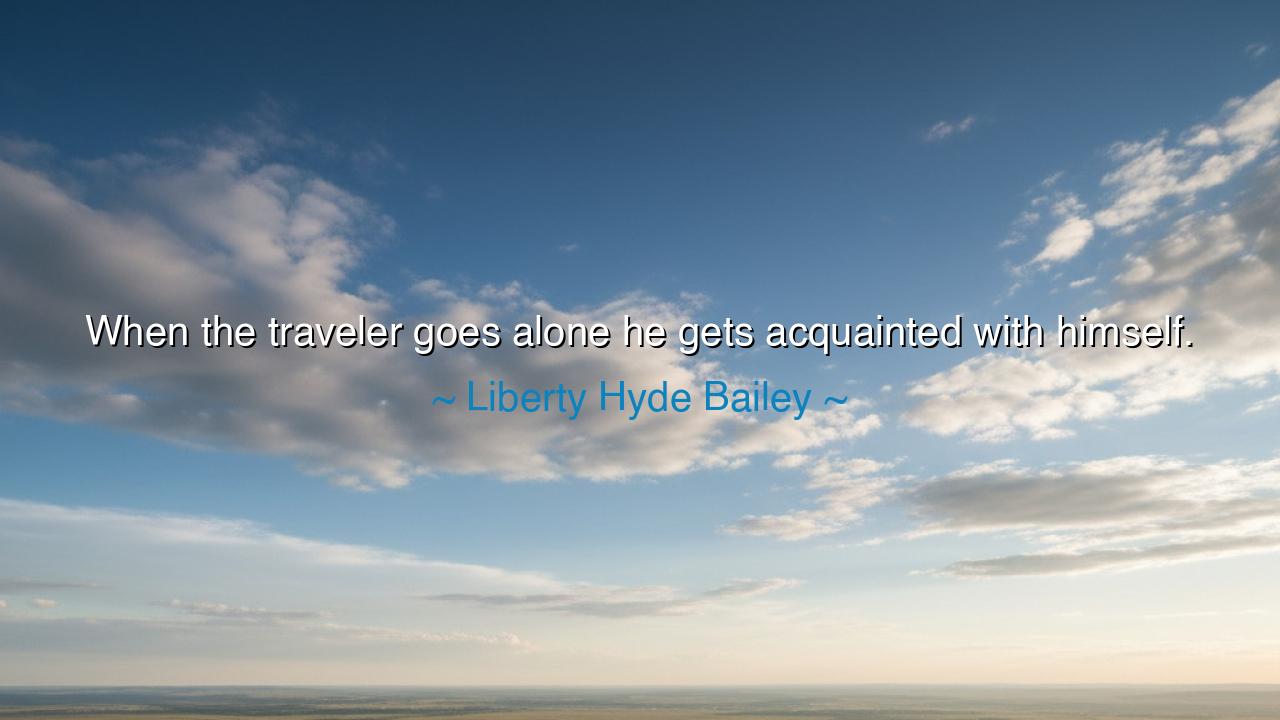
When the traveler goes alone he gets acquainted with himself.






Liberty Hyde Bailey, the great horticulturist and philosopher of the earth, once declared with luminous clarity: “When the traveler goes alone he gets acquainted with himself.” In these words is contained the essence of solitude, the trial of the spirit, and the awakening of self-knowledge. For while the world praises journeys filled with companions and clamor, Bailey reminds us of a deeper pilgrimage: the journey inward, discovered only when the traveler sets out in silence, unaccompanied, with no shield of company to distract from the truth of his own being.
The traveler who goes with others is often absorbed in their voices, in their laughter, in the comfort of shared burdens. Yet the traveler who goes alone finds himself confronted with a different companion: his own soul. There is no diversion from the questions that rise within, no escape from the thoughts that echo in the stillness. In solitude, masks fall away. The roles one plays before friends and society fade, and what remains is the naked self, unguarded and unembellished. It is here that acquaintance becomes possible—here that a man or woman may truly meet themselves for the first time.
The ancients spoke often of this truth. In the deserts of Egypt, the early Christian hermits fled from the noise of cities to live in caves, where their only company was silence, hunger, and the whisper of God. In India, the rishis retreated into forests, forsaking the clamor of kingdoms, so that by walking alone they might come to know the eternal Self. And in Greece, even the philosopher Pythagoras required his disciples to endure a time of solitude and silence, so they might hear the voice within more clearly than the voices without. All taught the same truth: to know the self, one must be willing to walk without companions.
History bears witness to this wisdom in the lives of the great. Consider Mahatma Gandhi, who often withdrew from the multitudes into fasts and silent retreats, not to abandon the people, but to strengthen his knowledge of himself before returning to them. Or think of Henry David Thoreau, who went into the woods of Walden Pond to live alone, and in that solitude discovered truths about simplicity, nature, and the human spirit that continue to guide seekers to this day. Their greatness was not forged in the crowd, but in the lonely road where the soul speaks to itself.
Yet this journey is not without fear. Many avoid solitude, for in silence the hidden anxieties and unhealed wounds rise to the surface. To walk alone is to risk encountering not only strength, but also weakness; not only wisdom, but also folly. Yet it is precisely this encounter that is necessary. For only by knowing both light and shadow within can a man become whole. To flee from this meeting is to remain forever a stranger to oneself, to wander the world without ever coming home.
The meaning of Bailey’s words, then, is both challenge and invitation. He calls us to courage—the courage to leave behind the chorus of voices that drown out the self, the courage to walk the quiet road and discover what dwells in the depths of our being. In solitude, the traveler does not lose the world; he gains himself, and by gaining himself, he can later return to the world with clarity, with strength, with authenticity.
The lesson is clear: seek times to walk alone. They need not be grand journeys across deserts or forests—though such roads have their power. It may be as simple as walking in the early morning, sitting in silence beneath the sky, or traveling without distraction to a place unfamiliar. In such moments, when all companions are absent, the true companion—the self—can finally be heard.
Practical action flows from this truth. Each week, create space for solitude. Step away from noise, from screens, from the demands of others. Let silence reveal what is hidden within. Write what you discover, reflect on it, and accept it. Do not fear the strangeness of this encounter; embrace it. For to be acquainted with oneself is the beginning of wisdom, the foundation of strength, the seed of peace.
Thus Bailey’s words stand not as suggestion but as ancient commandment: “When the traveler goes alone he gets acquainted with himself.” Let every person who longs for truth take this journey, for though the road may be quiet and unmarked, it leads to the most important meeting of all—the meeting with the self, where the soul awakens and life begins anew.






AAdministratorAdministrator
Welcome, honored guests. Please leave a comment, we will respond soon